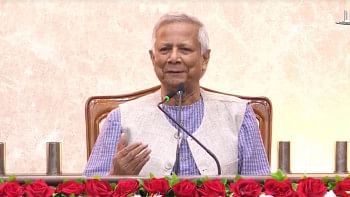Bangladesh on board UN paperless trade
Bangladesh yesterday signed an agreement on adopting paperless trade, an initiative of the United Nations to make export and import easier by reducing bureaucratic tangles through the use of technology.
Commerce Minister Tofail Ahmed signed the Framework Agreement on Facilitation of Cross-border Paperless Trade in Asia and the Pacific on behalf of Bangladesh at the headquarters of the United Nations Economic and Social Commission for Asia and the Pacific (UNESCAP) in Bangkok.
The full implementation of the agreement will not only reduce the cost of doing business but also the time, as the formalities for import and export activities at the airports, sea ports and land ports would be done digitally.
The agreement has the potential to harness the development dividends at the nexus of technology and trade, two key means of implementation for the 2030 Agenda for Sustainable Development, said Shamshad Akhtar, executive secretary of UNESCAP, in a statement.
Cambodia and China also signed the agreement, while several other countries present at the signing ceremony also expressed commitment to sign the treaty during the September 2017 session of the United Nations General Assembly in New York.
Open to all 53 UNESCAP member states, the regional treaty illustrates Asia and the Pacific's leadership in adopting innovative trade facilitation measures, the statement said.
It will provide the foundation for participating countries in the region to cooperate and accelerate progress in achieving paperless trade across borders, cut trade time and costs and ultimately boost economic competitiveness.
With full implementation of the cross-border paperless trade, export gains for the Asia-Pacific region are estimated to reach $250 billion annually, according to a recent UNESCAP study.
Even partial implementation of cross-border paperless trade could lead to: an export increase of $36 billion annually, decrease the time required to export by as much as 44 percent, and reduce costs by up to 31 percent.
The treaty is open for signature at the United Nations headquarters in New York until September 30 and will enter into force in 90 days after five countries have ratified the agreement.
The agreement has the potential to increase global merchandise exports by up to $1 trillion.
If the agreement is implemented properly, exports from developing countries are estimated to increase by $170 billion to $730 billion, while that from developed economies by $310 billion to $580 billion a year, according to the World Trade Organisation.
Comprehensive and faster implementation of the agreement will also boost the overall world export growth by up to 2.7 percent and global GDP growth by 0.5 percent, the WTO said.
Bangladesh's export receipts crossed $34.84 billion last fiscal year and the target for the current fiscal year has been fixed at $37.5 billion, Ahmed said.
The second biggest apparel exporter after China, Bangladesh also has export earning potential from pharmaceuticals, ICT, furniture, jute and jute goods, shipbuilding, light engineering and agricultural products.
At present, more than 5,000 digital centres are in operation across Bangladesh, while 11.9 crore people use mobile phones and 6.7 crore the internet, Ahmed said after signing the agreement.

 For all latest news, follow The Daily Star's Google News channel.
For all latest news, follow The Daily Star's Google News channel. 



Comments